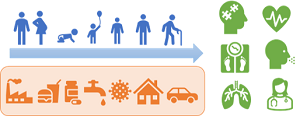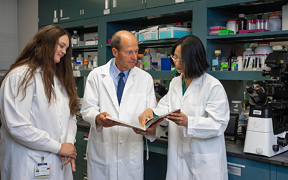Science Leadership
Superfund Research Program (SRP) staff and grantees are committed to advancing SRP research by presenting innovative findings, tools, and technologies to stakeholders in academia, government, and local communities.

SRP Director William Suk, Ph.D., M.P.H., is representing NIEHS on the e-ASIA Joint Research Program, an initiative launched by the National Institute of Allergy and Infectious Diseases and the National Cancer Institute. The program aims to develop a collaborative international research community to promote innovation in the East Asian region.
SRP Health Scientist Administrator Danielle Carlin, Ph.D., is working with NIEHS Health Specialist Amanda Garton to organize the Society of Toxicology meeting's Funding Insights Room and a workshop for new investigators to understand the NIH grant process, answer questions, and discuss ideas for applications.
Carlin served in the planning committee for a National Academies of Science Engineering and Medicine workshop titled "The Role of Companion Animals as Sentinels for Predicting Environmental Exposure Effects on Aging and Cancer Susceptibility in Humans" held December 1-3, 2021. Carlin also moderated one of the sessions during the workshop focused on the state of the science of environmental exposure, aging, and cancer susceptibility.
SRP Health Scientist Administrator Heather Henry, Ph.D., was selected as NIEHS representative for the Office of Science and Technology Policy, interagency body on research related to per- and polyfluoroalkyl substances (PFAS). The group will coordinate federal activities of 19 agencies related to PFAS research and development. Henry is also working closely with the Federal Remediation Roundtable (FRTR) to plan their Spring 2022 meeting, Application of Robotics, Machine Learning and Artificial Intelligence Technologies to Site Remediation.
SRP Health Specialist Brittany Trottier, M.P.H., served on the planning committee for the NIEHS Advancing Environmental Health through Implementation Science workshop held February 28 and March 1. The purpose of the workshop was to explore how environmental health scientists can use implementation science to advance environmental health.

A recent publication by Suk, Carlin, Henry, Trottier, SRP Health Scientist Administrator Michelle Heacock, Ph.D., and Health Specialist Sara Amolegbe, M.S.P.H., highlights how research supported by SRP can address the challenge of connecting exposures that occur early in life and prior to conception with diseases that manifest much later. According to the authors, advancing the knowledge of environmental exposures and their effects on later-life diseases will require a multidisciplinary approach to research, the need for data sharing and integration, and new tools and computation approaches.
SRP-funded researchers were recently featured in NIEHS highlights:
- Duke SRP Center Co-Director Heather Stapleton, Ph.D., described her research to understand the harmful chemical exposures that people may encounter in their homes and how they affect health.
- A feature on Dartmouth College SRP Center Director Celia Chen, Ph.D., explains how she is leveraging decades of research on Mercury to better understand how people are exposed to PFAS.
- Monica Ramirez-Andreotta, Ph.D., from the University of Arizona SRP Center, shared her experience engaging communities in science and her journey from SRP trainee to SRP researcher.
- University of Alabama at Birmingham SRP Center Director Veena Antony, M.D., described her work to improve lung health in residents near a local Superfund site.
North Carolina State University (NCSU) SRP Center researcher Morton Barlaz, Ph.D., was elected as a Fellow of the American Association for the Advancement of Science, the world's largest scientific society and publisher of the journal Science. He was recognized for his contributions to the field of environmental engineering, particularly for advancing understanding of solid waste engineering and related fundamental biological and chemical processes. Barlaz co-leads an NCSU SRP Center project to develop carbon-based sorbents for PFAS removal.

Research at the University of Kentucky SRP Center, led by Bernhard Hennig, Ph.D., shed light on the underlying mechanisms by which exposure to polychlorinated biphenyls can harm the body, how some components of our diets worsen these effects, and how good nutrition can protect health. Read more in the latest SRP Public Health Impact Story.
to Top



